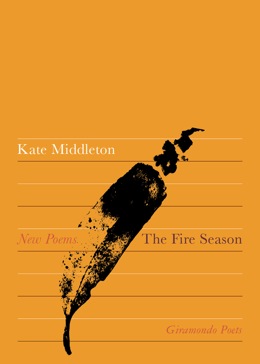 Fire Season: New Poems by Kate Middleton
Fire Season: New Poems by Kate Middleton
Giramondo Publishing, 2009
Fire Season is Kate Middleton's first book of poetry, after numerous publications in journals and newspapers in Australia, England and the US. Middleton has trained as a librettist, and we see a classical influence permeating this book, with narrative voices discovered for literary figures from Penelope, to Leda, Desdemona, and even the Minotaur's previously undiscovered, equally bullish, sister. Middleton's technique of inhabiting specifically located moments of time and place extends from classical to popular culture, including poems written 'with' Lauren Bacall, Lana Turner, and Judy Garland.
More frequently though, Middleton writes of passing moments shared between two people, selected and distilled with great precision. At their best, these sites of unglossed awareness feel true and available, beyond their given locus, as in 'Your feet / Love poem':
Just like there is nothing dainty in your feet.
They are browner than mine could ever be
from time spent north. A beautiful code – the language
of everything I'll never know of you.
These moments of connection, though, are juxtaposed with signs of the inevitability of their loss, through the recurring motif of the photograph:
This photograph
was the most personal – no face, the identity
told in the skin knotted by work, and the simplicity
of sandals. There is nothing dainty in them.
This scene – simple, instantly familiar, yet utterly evocative in its elegant conflation of the lived experience with a symbol of its own transience and fragility – captures the volume's abiding concern with memory, and our relation to the past.
Middleton is a crafter with a steady hand. Lines and stanzas are utilised exactingly, and all the poems appear to be conceived within a self-consciously ascetic aesthetic. There is a studious avoidance of elaborate symbolic conceits and the sublime, and Middleton here follows a tradition of poetry focused on the importance of the objects and moments that surround our real lives. At their best, these poems combine these materials with flashes of conceptual clarity, delicately dressing ideas with experience, as in 'From a Language of Grieving':
I watched the water thicken for a week and / never
changed it as the flowers you gave me / gave way
to lethargy / their cruelly hacked stems hanging
slack as the petals dropped // gathered in firsts we
crushed them / look we said, eager, they bruise
easily and / come to dust
These themes of separation and absence, as mediated through memory, cohere the work. This is sometimes beautifully achieved through densely woven stitches of meaning, as in 'Fire Season'. Here the image of a box of photographs placed by a fire-threatened house's door speaks to our sense of the desperateness with which we struggle to preserve the past, and the inadequacy of any representation of experience, even of memory itself.
Photographs jacketed and boxed
by the door,
an easy grab at memory
in flight – your eyelids
and the exit, the close proximity of one truth
and the next.
The final, tantalising lines of this poem perhaps suggest that the impossibility of adequately representing experience applies not only to photography, or even the formation of memory, but to poetic expression itself – although, like a good poet, this does not stop Middleton from writing a poem about it!
This self-referentiality, this inclusion of the reader in the poet's process, is seen again in 'Essay on Absence'. This technique is part of the works' vigorous formal openness. These poems range widely in arrangement, from the self-admittedly prosaic, abovementioned 'Essay', to unrhymed sonnets, to enjambments provided courtesy of / lines endings / that are not // line endings. This is generally to good effect, not merely ostentatious, and it is perhaps in these formal elements where the poetry seems most assured in its risk-taking.
Middleton controls her work on these terms, but sometimes these understated vignettes are too private, too lacking in moving vitality for an audience unaware of the context of her 'moments'. For they are, largely, her moments, or at least they are written as if they are, penned exclusively in the first person and frequently addressed to absent muses. Despite their personal nature, there is an austere, almost detached quality to some of these poems (perhaps appropriate given the references to stoic Romans and circumspect Penelope, variously). This leaves them never in danger of sentimentality or naivety, but perhaps there are too few emotional risks in their wry ironies, leading to some unsatisfying abstractions, as in 'October':
October, then. Six months
almost the same as those ten days:
the luminosity of grief, as I picked up
Updike, rolled through fifty pages
and packed my belongings
That fascinating debris. To swim
the Hellebore, impossible now – like
the utopia of suburbia.
These sparse patches feel as though they are partly a result of the difficulty of sustaining imaginative intensity over the ambitious thirty-seven poems this volume contains. In fairness, while sometimes dry, Middleton's voice never approaches cliché.
Overall, Fire Season leaves the reader in no doubt that Kate Middleton is a talented, disciplined poet, with a distinct poetic voice and sense of purpose. At its best this poetry is both tantalising and satisfying, familiar yet distant, comforting while haunting. This is not sustained over the full volume, however, and some of the pregnant moments around which these poems are arranged end up falling fallow. There is a significant difference between the best poetry here and the rest. A shorter, more concentrated volume might have been better, but there is still enough here to intrigue, reward and, most importantly, return to.
Seamus Barker is studying English and Social Theory at the University of Melbourne.













